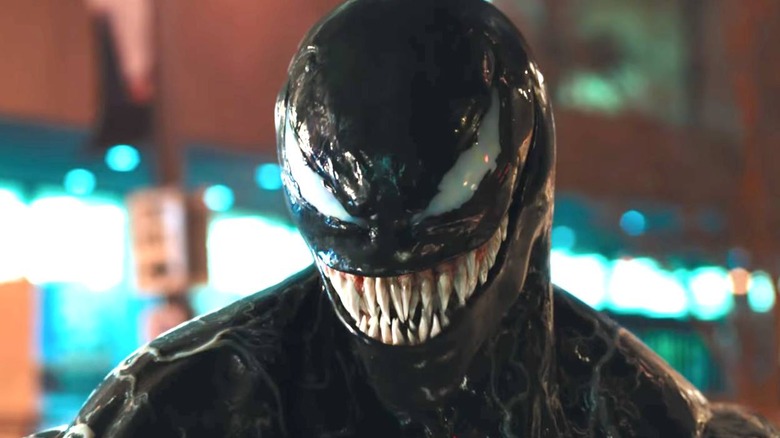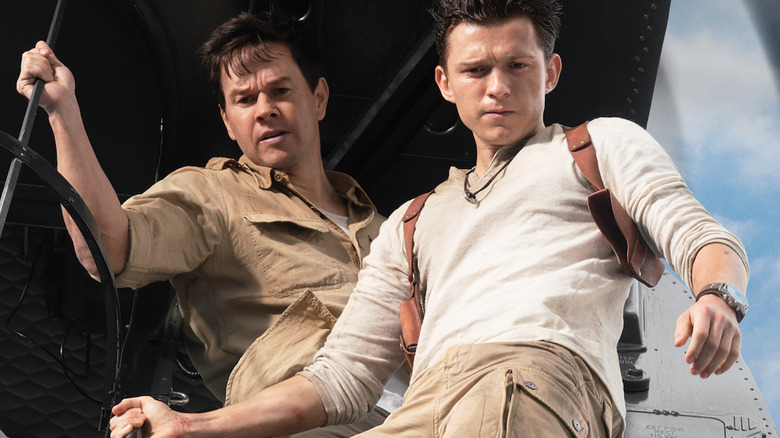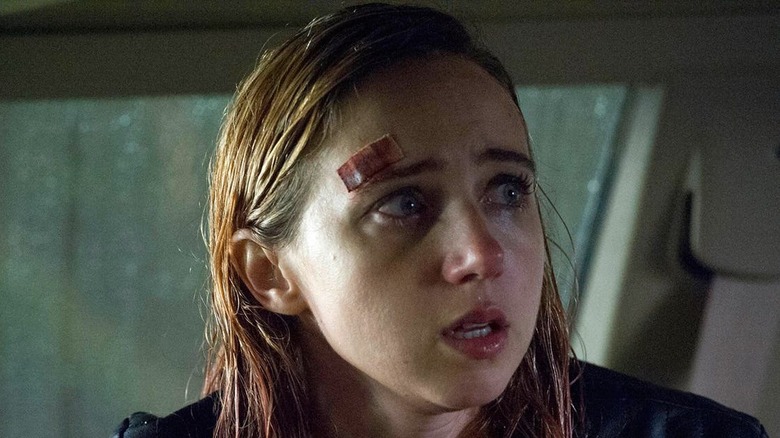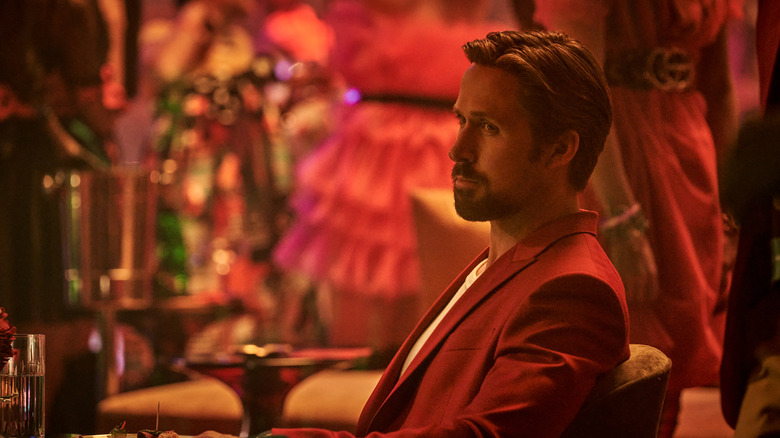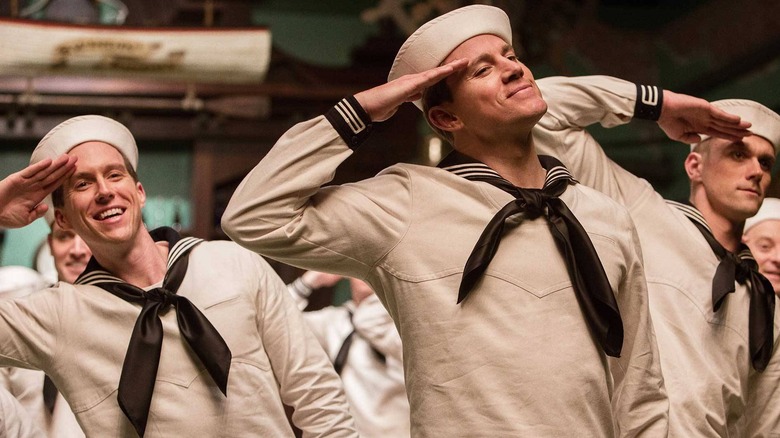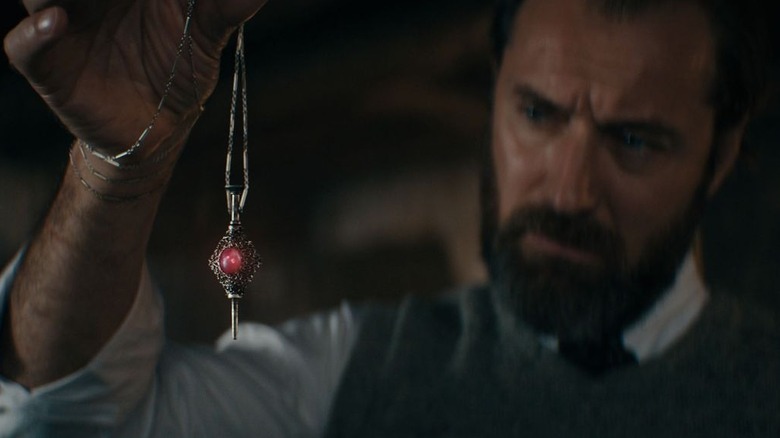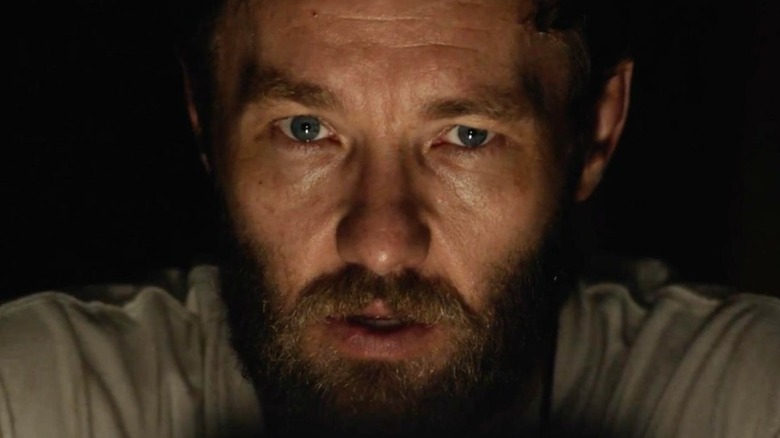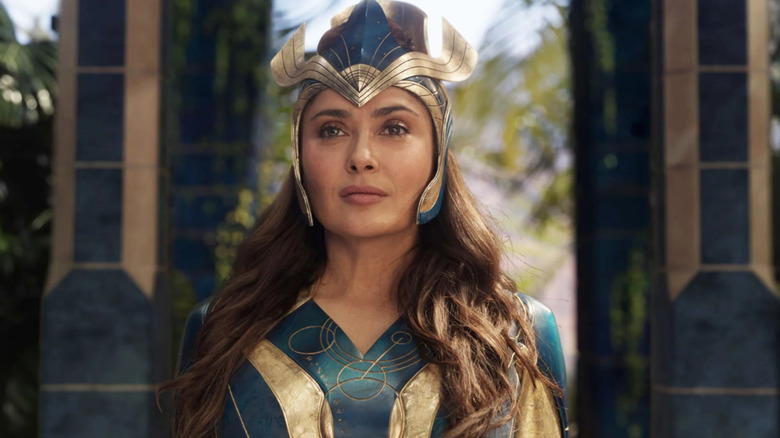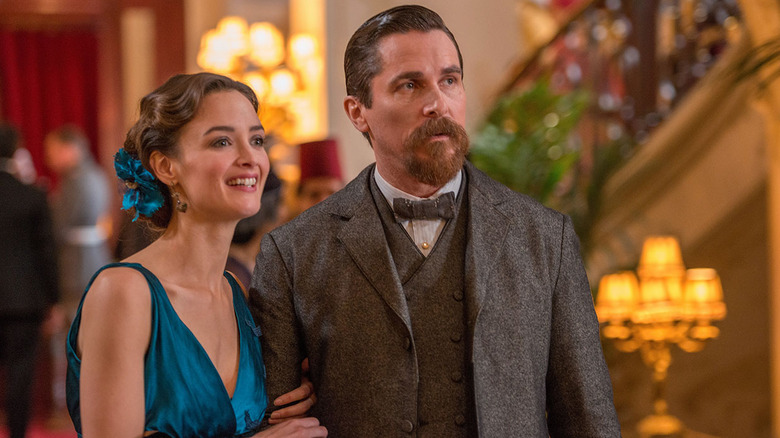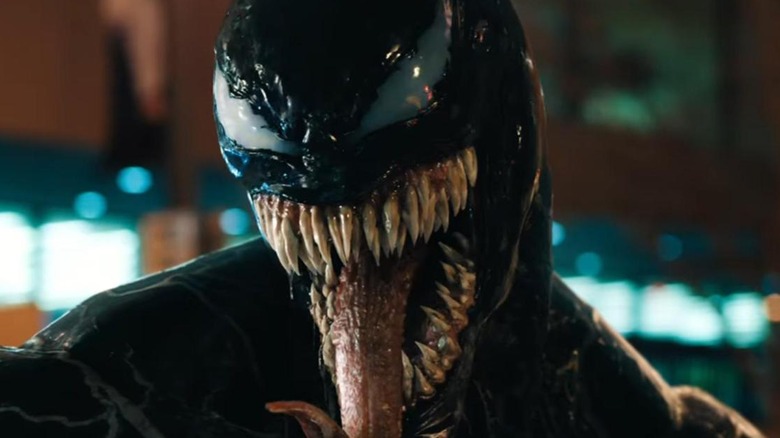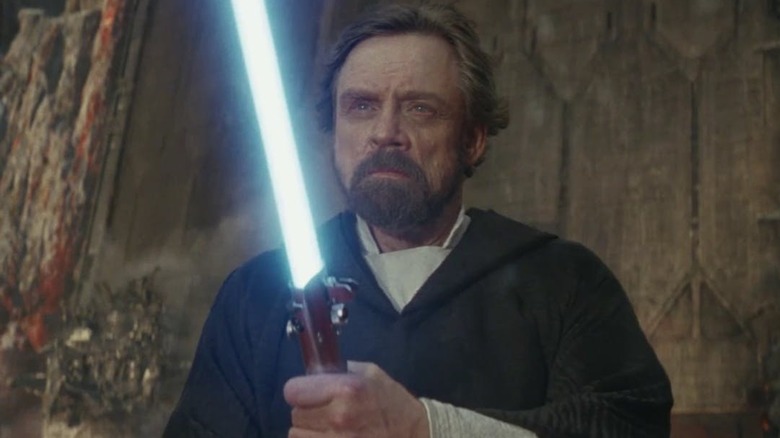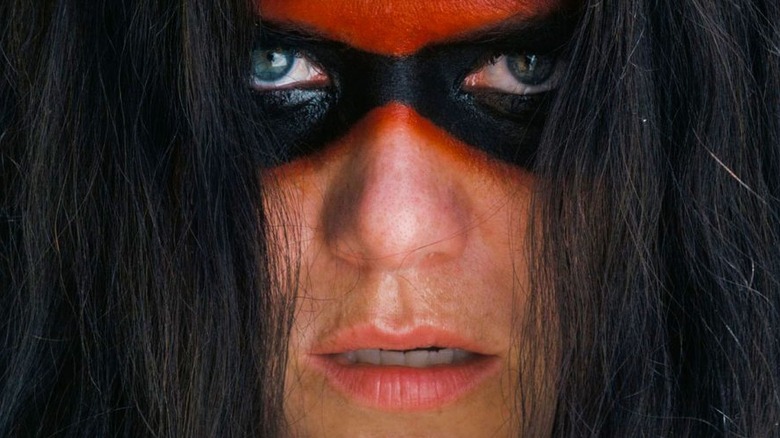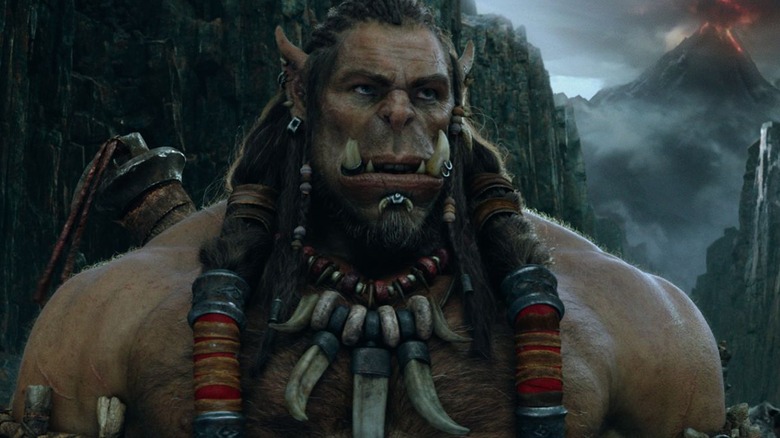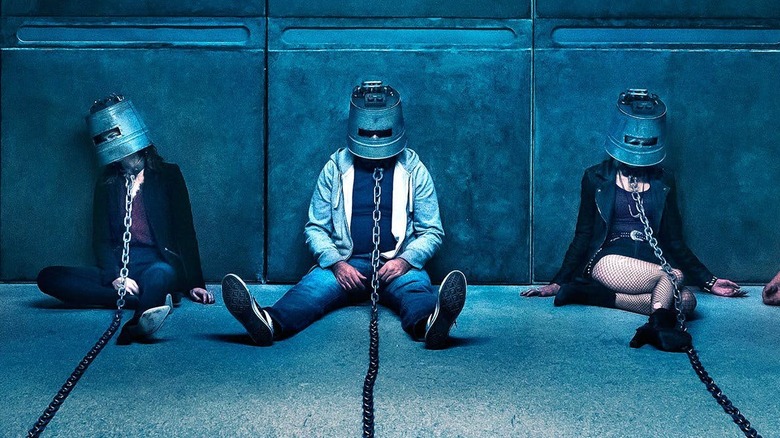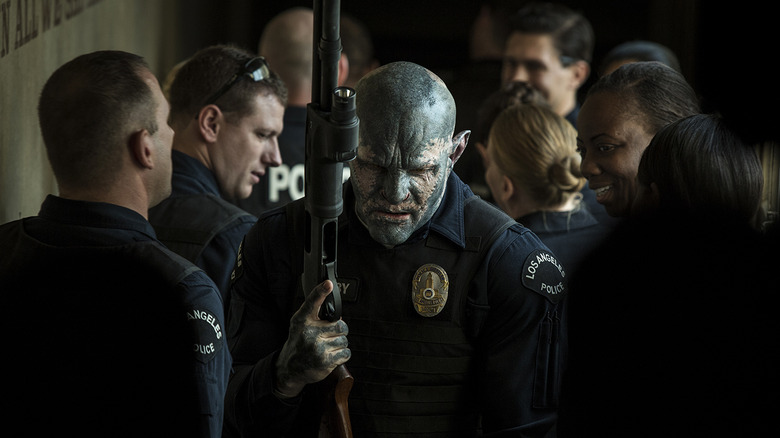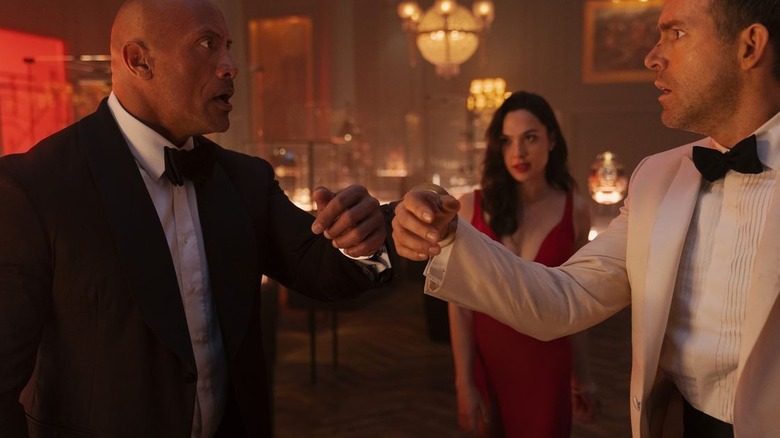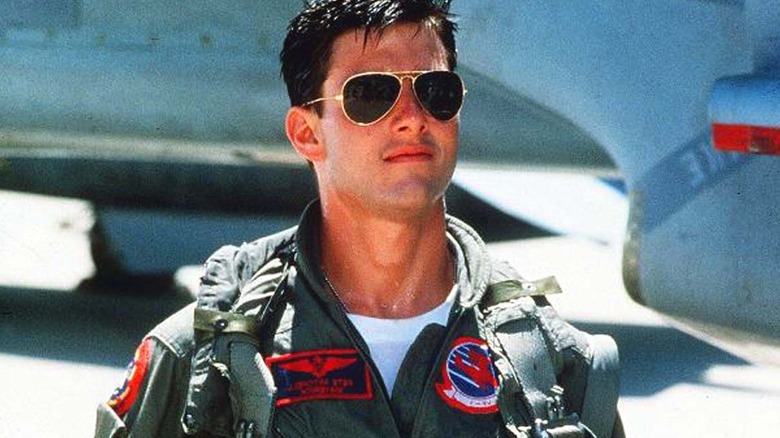The Biggest Divides Between Audience And Critic Scores On Rotten Tomatoes
It goes without saying that film critics and moviegoers often disagree. There are plenty of blockbusters that audiences loved but sent critics into hysterics. Meanwhile, there are quite a few art films that critics adored but casual film fans just didn't get. Individual taste is a tricky thing, and it's led to quite a bit of friction between the two groups. And nowhere is that more evident than Rotten Tomatoes.
The beloved-by-some, infamous-to-others review aggregator not only collects critical reviews but audience reactions too, and they give a fascinating insight into what the average Joe enjoys and what professionals prefer. Sometimes, the gaps between scores are insignificant—so tiny you barely even notice. But on more than a few occasions, the differences have been drastic, causing people on both sides to shake their head in bewilderment. From indie horror flicks to big-budget fantasy films, these are the biggest divides between audience and critic scores on Rotten Tomatoes.
Uncharted was unloved by critics
Video game movies don't have a reputation for being particularly good. Actually, most of them are downright terrible (even if they do tend to make a profit). So it wasn't much of a surprise when "Uncharted" got a rotten rating on Rotten Tomatoes, though when grading the movie on a "video game movie curve" its score wasn't that bad.
Based on the video game series of the same name, "Uncharted" follows the adventures of globe-trotting treasure hunter Nathan Drake (Tom Holland) and his fre-nemy Victor "Sully" Sullivan (Mark Wahlberg). Unlike the video game, in which Drake is a veteran treasure hunter, the movie introduces Drake as a newcomer on his first quest.
Capitalizing on Holland's post-"Spider-Man: No Way Home" star power, "Uncharted" opened to a mightily impressive $44 million. Credit Holland and Wahlberg's bankability and the "Uncharted" brand for that opening weekend, but then "Uncharted" legged it out to $147 million domestically and $397 million worldwide, which is directly attributable to the movie's popularity with moviegoers. In fact, there was a big gap between critics and audience scores for "Uncharted," with the critical consensus calling it "a disappointing echo of superior adventure films," while the audience hailed it as "a fun throwback to classic adventure movies of the past." Whichever side you land on, the vast discrepancy between critics and audiences' opinions on a video game-based blockbuster was hardly uncharted.
The Monster frightened away audiences
A24 has risen to the top tier of film distributors by bringing filmgoers such flicks as "Moonlight," "Green Room," and "Ex Machina" — all films that have united both critics and audiences. But not every A24 film can bridge that gap.
Released in 2016, "The Monster" is an indie horror film that impressed quite a few critics but scared away general audiences. The plot follows an alcoholic mom (Zoe Kazan) and her estranged daughter (Ella Ballentine) as they drive through the woods one dark and fateful night. That's when they get into a wreck in the middle of nowhere. On top of the family drama brewing inside the automobile, things get even more complicated when a man-eating creature shows up, forcing mother and daughter to spend some serious family bonding time as they try to survive the night.
Critics were impressed with the horror flick from director Bryan Bertino, giving the movie an impressive approval rating on Rotten Tomatoes. Praise was heaped upon the moody atmosphere of "Monster," stripped-down plot, and ability to balance big emotions with big scares. Moviegoers weren't so pleased, and the film wound up with an audience score about half as positive. A lot of horror fans found the movie boring, simplistic, and predictable, and some were critical of the film's heavy use of flashbacks. However, many believe that Kazan and Ballentine were impressive as the bickering mother and daughter, and maybe it's their performances that kept the divide between the audience and critics from growing any more monstrous.
The critical divide on The Gray Man was black and white
Ten years ago, a $200 million "spy vs. spy" action movie starring two name stars would open on 2000 screens. These days, those kinds of movies seem to go to Netflix. That was the case for "The Gray Man," starring Ryan Gosling and Chris Evans.
In the film, Gosling plays the CIA's number one agent, "don't call me 007" Six, who is being hunted down by a sadistic, mustachioed Lloyd Hansen, played by Chris Evans, in a far cry from his career-defining performance as Captain America (the film is directed by the Russo brothers, who oversaw "Captain America: The Winter Soldier" and the last two "Avengers" films).
While "The Gray Man" had a limited theatrical release, its primary venue was people's living rooms — and critics weren't impressed, nailing the movie with a rotten rating, and a consensus review saying "...it's filled in with lukewarm leftovers from far better films," maybe the most unappetizing review ever.
But you know who did like it? The audience, with a consensus review stating: "Add this to your queue with confidence, action fans: 'The Gray Man' has a great cast, exciting set pieces, and a solid story." When it came to the critical response, there were no shades of gray when it came to "The Gray Man" — critic and audience opinions were clearly black and white.
Audiences didn't hail Hail, Caesar!
From the snobbiest critic to the slobbiest moviegoer, the Coen Brothers are beloved. If you check out their films on Rotten Tomatoes — "No Country for Old Men," "The Big Lebowski," "True Grit" and more — the gap between the audience score and the critic score is practically non-existent. Even on the super rare occasions when the Coens flop, like "The Ladykillers," audiences and critics share the hate.
Of course, there are a few exceptions here and there, like "Intolerable Cruelty" and "The Hudsucker Proxy," but the most divisive movie of the Coens' career so far might be "Hail, Caesar!" Set in 1950s Hollywood, this quirky comedy follows studio fixer Eddie Mannix (Josh Brolin) as he tries to calm and corral a group of unhappy actors, not to mention a cadre of communist writers who've kidnapped the studio's biggest star. While critics thought the film was divine, it seems the audiences wanted to stab "Caesar" in the back.
The audience reaction to this quippy period piece remains middling on Rotten Tomatoes, while the critic approval rating is much higher. Most critics adored the half-paean, half-parody of the old studio system, complete with water aerobics and tap dancing. But it seems the humor didn't work for most moviegoers, and many were frustrated by the plot, describing it as "convoluted and confusing," "thin and scattershot," and "all over the place." With big names like Channing Tatum, George Clooney, and Scarlett Johansson, you'd think everyone would be enamored with the film; in Hollywood, however, few things are guaranteed.
Dumbledore's score was not so Fantastic
The Harry Potter franchise is the highest-grossing book adaptation of all time, with nearly $10 billion in worldwide box office; the books did pretty well, too. Clearly the adventures of Harry, Hermione and Ron have a lot of fan support, but the "Fantastic Beasts" prequels set decades before the Boy Wizard? Perhaps not so much.
The second film in the series – 2018's "Fantastic Beasts: The Crimes of Grindelwald" – earned rotten reviews from critics and fans. But it still earned money, approximately $648 million on a $200 million budget. However, that much fan antipathy is not a good sign for a franchise moving forward, and something was clearly rotten in the state of Hogwarts (and not just the Tomatometer).
Warner Brothers still went full speed ahead with the third film, 2022's "Fantastic Beasts: The Secrets of Dumbledore," which in turn garnered terrible critics' reviews, though not as bad as "Grindelwald." It also barely broke even, with $404 million worldwide (a $200 million+ drop from the second film and 100% from the first film) on a $200 million budget. Yet the moviegoers who did see "Dumbledore" liked it, giving it a much-higher consensus score than "Grindelwald" and a solid review, saying "It's a little long and the effects might be better than the story, but for fans of the franchise, this is a fairly 'Fantastic' sequel." Hardly spellbinding, but still solid, especially coming off the universally reviled "The Crimes of Grindelwald."
Critics came out for It Comes at Night
Critics came out strong for "It Comes at Night," while audiences complained the movie was so dull because nothing came at all. Directed by Trey Edward Shults, this grim horror film is set in a post-apocalypse, where a plague has wiped out most of humanity. The survivors are hunkered down, hoping to outlast the infection, and one particular family (played Joel Edgerton, Carmen Ejogo, and Kelvin Harrison Jr.) is super hardcore about keeping the outbreak at bay, following strict rules about who can go outside and when.
However, their rules and regulations come crashing down when another family (Christopher Abbott, Riley Keough, and Griffin Robert Faulkner) shows up, seeking shelter. At first, it seems like the two clans might get along, but it doesn't take long before the families are clawing at each other's throats. Critics and audiences were similarly divided, and the promotional materials may have been to blame for that. The trailers promised a fast-paced movie full of action and zombies. In reality, it's a slow-moving character study, and the undead monsters only appear in freaky dream sequences.
Perhaps feeling betrayed by the marketing, moviegoers were ticked off with the film, giving it a tepid rating on Rotten Tomatoes. They went into the movie expecting zombies, and came out claiming that "nothing happened," that the film "leads to nothing," and that it's "completely pointless." But critics were impressed with Shults' ability to "build dread with ruthless efficiency and minimal gimmickry." As a result, they gave the movie high marks for its "unbearable tension" and "atmosphere of uncertainty."
Critics thought this MCU epic was an eternal bore
With more than $27 billion in worldwide grosses and nearly across-the-board "Fresh" critics and audience scores on Rotten Tomatoes, the Marvel Cinematic Universe has the clout to take risks now and then. Or so the studio thought. Because if you look at that list, the worst critics' score among theatrical releases by a pretty significant margin belongs to 2021's "Eternals."
The film follows the multiple millennia-long adventures of the Eternals, android, god-like beings who protect the people of Earth from morphing creatures that look like something Hayao Miyazaki left on the cutting room floor, known as the Deviants.
While the MCU is critic-proof, it usually doesn't need to be, as critics gave "Fresh" reviews to every single MCU movie (yep, even "The Incredible Hulk" and "Thor: The Dark World") ... except for "Eternals," which earned the MCU's one-and-only cinematic "Rotten." From critics that is, as moviegoers kinda liked it, giving "Eternals" an audience score higher than even "Iron Man 2," "Thor," and "Captain America: The First Avenger."
However, moviegoers voted with their wallets, and "Eternals" earned a meager $164 million and $402 million worldwide on a $200 million budget, making it Marvel's worst performer (not counting "Black Widow," which was simultaneously released on Disney+) since 2011. Surprising no one, when Marvel dropped its plans for Phase 5 and 6 at San Diego Comic Con, "Eternals II" wasn't on the lineup.
Critics thought The Promise was way too sappy
Hollywood loves making movies about the Holocaust, and as a result, audiences have become enraptured by such films as like "Schindler's List" and "The Pianist." However, with all that attention on Nazi war crimes, there are a lot of genocides that don't get the Hollywood spotlight. For example, there aren't many movies about the Armenian genocide, when the Ottoman Empire murdered 1.5 million Armenians from 1915 to the early 1920s. Director Terry George ("Hotel Rwanda"), however, hoped to right that wrong by bringing some attention to the much-neglected tragedy in "The Promise," a 2016 film starring Oscar Isaac, Christian Bale, and Charlotte Le Bon.
While it seems the film's audience score on Rotten Tomatoes was initially hit by genocide-deniers looking to sabotage the film, the approval rating eventually bounced all the way up to Certified Fresh. It seems film fans were impressed by the film's epic scope, and many called it an important movie for shedding light on an oft-forgotten event. But critics were far less kind, especially in regards to the love triangle — aka the "unsatisfying romantic plot" or the "stock romantic melodrama" — between Isaac, Bale, and Le Bon. As a result, the critics score sits far lower, because movie experts felt the movie failed to live up to its promise.
Venom scared away critics
After Topher Grace debuted a forgettable Venom in "Spider-Man 3," fans of the character had to wait years for somebody to do their beloved antihero justice. Then Tom Hardy came along in 2018, pulling double duty as reporter Eddie Brock and the titular symbiote. Fans adored Hardy's portrayal of the muscle-bound monster. Not only did they pour into theaters, they also gave the movie an overwhelming approval rating on Rotten Tomatoes.
Audiences praised Tom Hardy's performance, agreed the action sequences were awesome, and almost everyone seemed to appreciate the film's sense of humor. Everyone, that is, except for the critics. Since Spider-Man was nowhere in sight, the critics decided to swing in and do their best to take "Venom" out, giving the film a rather pathetic percentage.
What's interesting is that while fans thought the movie was full of laughs, critics were actually bothered by the movie's tone ... or lack thereof. One of the biggest critiques was how the film jumped from comedy to horror to romance, without ever really settling on one genre. However, the critics and the fans did agree one aspect: everybody wished the movie could've been a little more R-rated.
The Last Jedi caused a great disturbance in the Force
Directed by Rian Johnson, "Star Wars: The Last Jedi" follows the further adventures of Rey, Finn, and Poe Dameron as they try their best to outrun the First Order, defeat Kylo Ren, and bring a grizzled Luke Skywalker out of retirement. Needless to say, the film earned stacks and stacks of cash, but despite all that money, this space opera quickly become one of the most controversial blockbusters ever made.
The fan backlash was intense and vitriolic, giving "Jedi" a shockingly low audience score on Rotten Tomatoes. So, what caused all the ill-will toward Rian Johnson's sci-fi flick? Some criticized it for being too politically correct; others simply found the tone uneven, but by far the biggest complaint was how the film turned Luke Skywalker into a bitter old man who's given up on the Force.
While some audiences were appalled with the eighth film, critics went crazy for Rian Johnson's addition to the series, giving the movie an extremely fresh rating. Fans may have been upset with Luke, but critics thought the Jedi's new character arc was absolutely perfect. Of course, despite the divided reaction, the only thing Disney probably cared about was the $1.3 billion the film earned at the box office.
Critics and audiences went to war over Mohawk
Shot on a shoestring budget, "Mohawk" is an indie revenge thriller that follows two Mohawk Indians and a British soldier who are forced to fight for their lives after ticking off a band of bloodthirsty Americans. But even though the movie has some awesome kills, veers into horror territory, and features WWE wrestler Luke Harper, it didn't exactly impress Netflix audiences. The movie currently sits with a rather sad audience score on Rotten Tomatoes.
So what didn't moviegoers like about this brutal revenge flick? Well, some were turned off by the film's low budget, with one commenter saying it looked like Sears supplied the outfits. Some compared this "amateur" movie to a "student film project," and several thought the acting was shoddy and over-the-top. However, in addition to sticking up for the actors, critics felt there was a lot going on beneath the indie surface of "Mohawk," praising the movie for its brutal look at America's bloody past. As a result, "Mohawk" won a very positive approval rating from critics, and is a pretty awesome tale of wrath and revenge.
Warcraft couldn't cast its spell over critics
Based on the popular video game franchise, "Warcraft" was a major failure at the domestic box office, earning $47 million against its $160 million budget. But the movie fared much better overseas, pulling in a worldwide total of $433 million. And evidently, video game fans around the planet banded together to give "Warcraft" a reasonably impressive score on Rotten Tomatoes. Even though the movie bombed in the US, it currently sits with a pretty respectable audience score. Fans of the film admit the acting is subpar, but almost all were blown away by the movie's visual effects, especially when it came to the CGI orcs.
But despite all that computer generated magic, critics weren't buying what director Duncan Jones was selling, and they gave the movie a staggeringly awful Rotten Tomatoes score. As it turns out, critics weren't as willing to forgive the bad acting as audiences were, and they were especially critical of the lack of well-developed characters. Another roadblock was all the "Warcraft" mythology, which might have been appealing to people who'd been playing the games for years, but according to critics, all that emphasis on lore just wasn't going to work for the uninitiated. It evidently didn't work for mainstream American audiences either, so the chances of seeing a "Warcraft 2" anytime soon seem pretty slim.
Jigsaw was a great game for some, torture for others
Did anyone really think that "Saw 3D" would be the last chapter of the "Saw" franchise? After that implication, in 2017 fans were tossed back into the world of deadly puzzles and terrible torture devices with "Jigsaw," the eighth installment in the series. And it seems that seven year break in between films was a pretty good move on the part of Twisted Pictures, as the audience approval rating on Rotten Tomatoes skyrocketed all the way to the series' highest. "Saw" fans were glad to have John Kramer (Tobin Bell) back, appreciated all the new traps, and ranted and raved about all the twists and turns throughout the films.
It goes without saying that critics weren't so keen on Jigsaw's return. (In fact, they haven't really been nuts about the entire franchise.) While audiences appreciated the plot twists, critics found them dull. They also didn't really enjoy the killer's traps, describing them as feeling "more like remixes of the past than anything drastically new." But really, most critics were just bored by the entire premise.
The so-called "torture porn" genre has never really been embraced by critics, and by 2017, it had lost all shock value, as critics described Jigsaw's antics as "stale," "laborious and uncreative," and "a dumb and ugly waste of energy, resources and time." So when you see the dismal critic score, it's because they found "Jigsaw" to be nothing but torture.
Bright was magical for moviegoers
When "Bright" hit Netflix in 2017, the streaming service had a major hit on its hands. Over 11 million people watched the fantasy-buddy cop thriller over its debut weekend, and the film quickly became one of the most-watched originals in Netflix history. Starring Will Smith and Joel Edgerton, the movie followed two police officers — one a human and one an orc — as they're drawn into a mystical plot involving elves, gangs, and a magic wand. And Netflix fans adored this weird mishmash of genres, giving "Bright" a fantastic audience score.
According to the audience reviews on Rotten Tomatoes, people thought the fantasy world created by director David Ayers and screenwriter Max Landis was pretty phenomenal. A lot of people also appreciated the social message about racial inequality, under the guise of men and monsters. But critics couldn't have disagreed more, calling the screenplay weak and the allegory hamfisted. By the time the critical dust had settled, "Bright" found itself reeling from both the scathing reviews and a Rotten Tomatoes score to match. It seems that while audiences were enamored with this world of fairies and firefights, critics found the film empty, lazy, and lacking any sort of magic.
This Netflix hit put critics on Red Notice
It might be hard to believe that a $200 million blockbuster starring Dwayne Johnson, Ryan Reynolds and Gal Gadot would be a made-for-TV movie, but in the streaming era, things are changing rapidly.
Released in November 2021, "Red Notice" is a Netflix original in which Johnson plays an Interpol agent forced to team up with his old adversary, Reynolds' wise-cracking art thief, and track down Gadot's notorious criminal. Hilarity and explosions ensue in a movie that would have likely topped the box office charts had it been released theatrically. Instead, it topped the streaming charts, becoming one of Netflix's most-watched movies of all time ... much to critical consternation.
"Red Notice" earned a downright "Rotten" score from critics, with the critical consensus saying that its "...gaudy ingredients only make the middling results more disappointing." Do you know who wasn't disappointed, however? The millions upon millions of people who streamed it. Audiences gave "Red Notice" incredible reviews, saying that it "...promises big stars trading quips on a fast-paced action adventure — and delivers across the board."
It's hard to say how much green "Red Notice" would've earned if it had been released theatrically, but based on its strong audience reviews and stacked star power, it wouldn't have been wise to bet against it.
Top Gun was no Maverick
Movie critics and moviegoers not seeing eye-to-eye is hardly a new phenomenon. Take for example, 1986's "Top Gun," the movie that made Tom Cruise a star. Well, a bigger star, as he'd already had a big hit with 1983's "Risky Business."
"Top Gun" topped the worldwide charts in 1986, earning $176 million, or about $460 million in today's dollars. Bear in mind that the worldwide box office was much smaller in 1986, as that $176 million was exclusively from North America. Thanks to its stellar performance, and decades of playing on Saturday afternoons on TNT, "Top Gun" has become a generation-defining classic for millions of viewers ... just not critics.
"Top Gun" has a mediocre critics' score on Rotten Tomatoes, with a critical consensus review saying it: "...offers too little for non-adolescent viewers to chew on when its characters aren't in the air." Ouch. Well, perhaps it was an adolescent audience who bestowed "Top Gun" with strong reviews, quite a bit higher than the critics. To show that there were no hard feelings, and time does indeed heal all wounds, the 36-years-later legacy sequel, "Top Gun: Maverick," earned near-perfect Rotten Tomatoes reviews from fans and critics. Now, it seems, both parties are on the highway to the Danger Zone.
